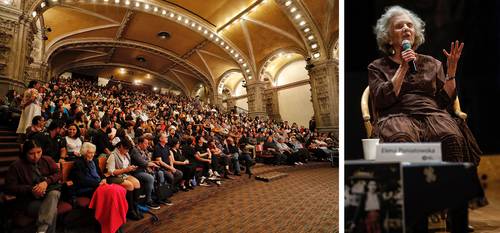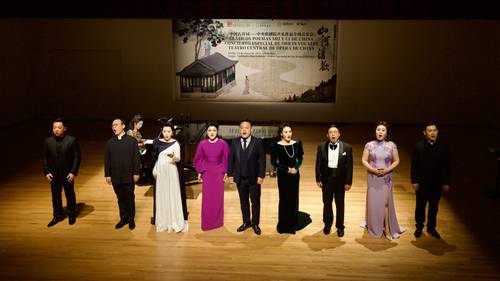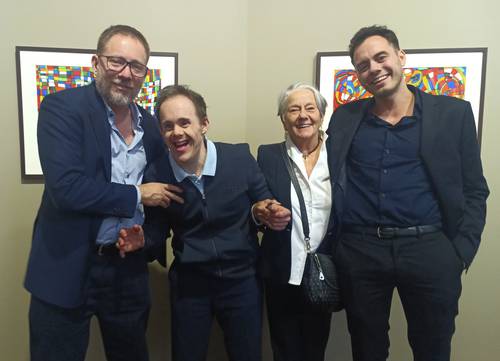Rosario Castellanos was born 100 years ago and her legacy is reinvented in numerous events.

Rosario Castellanos was born 100 years ago and her legacy is reinvented in numerous events.
Tributes, film, theater, exhibitions, and publishing projects make up the cultural program dedicated to the author // UNAM, INBAL, and UASLP participate in the commemoration
▲ Rosario Castellanos in 1971. Photo from the Mayo Brothers' photographic archive, located in the National Archives.
Daniel López Aguilar
La Jornada Newspaper, Sunday, May 25, 2025, p. 2
The name Rosario Castellanos shines with a rare relevance in the literary world.
As the centenary of his birth is celebrated this Sunday, his legacy is being reinvented and revived through a wide range of tributes, exhibitions, readings, and publishing projects that engage with his ideas to address contemporary challenges.
This period is marked by the official recognition of the Chiapas State Congress, which declared 2025 the year of the Chiapas writer. In Comitán, the land where she grew up, a space is being prepared with an effigy and engraved fragments of her verses, a tangible link to the place that fueled much of her literary creation.
A writer, poet, feminist, philosopher, diplomat, journalist, professor, and playwright, Castellanos spent her childhood in that state, where her critical perspective on social and cultural inequalities became the driving force behind her artistic output. This background allowed her to develop an essential voice for questioning power structures from the intersection of gender, culture, and class.
The national celebration is strengthened by activities such as the discussion "Rosario Castellanos: Woman of Looks and Words," which will bring together writer and journalist Elena Poniatowska, a friend and intellectual accomplice of Castellanos, today at the Palacio de Bellas Artes in Mexico City.
This event is part of a program promoting his legacy both domestically and internationally. In Madrid, the National and International Academy of Poetry of Mexico—based at the Mexican Cultural Institute in Spain—is organizing an evening to celebrate the relevance of his thought.
In the academic and cultural sphere, the Autonomous University of San Luis Potosí (UASLP) will broadcast a special program on its university radio station, accompanied by educational materials for networks and educational centers.
At the National Autonomous University of Mexico (UNAM), exhibitions and reading clubs invite you to rediscover his work from renewed perspectives.
The exhibition "A Sky Without Borders. Rosario Castellanos: Unpublished Archive (1925-2025"), held at the Antiguo Colegio de San Ildefonso and with the support of her son, Gabriel Guerra Castellanos, showcases objects, manuscripts, and photographs that reveal intimate aspects of her life and consolidate her cultural legacy.
Letter writing contest, presentations, essays
In the publishing world, UNAM has recently published two volumes: a selection of poetry curated by Orlando Mondragón and a collection of short stories with a prologue by Olivia Teroba, which engage with the concerns of younger generations. At the same time, the epistolary contest "Cartas a Rosario" (Letters to Rosario) recovers the author's intimate voice from a contemporary perspective.
Added to these proposals is Sara Uribe's book Rosario Castellanos: Materia que arde , which offers a fragmented and lyrical reading from a feminist perspective, evoking the writer who paved the way for critiquing gender norms. Her thought resonates in these new works, where she remains an essential reference for debates on identity, power, and social justice.
Her poetry, a profound reflection of her vision and experience, is now being translated into 18 indigenous languages of Chiapas and Guatemala, in an effort to honor her commitment to cultural diversity and linguistic justice. This project includes a website hosting audio archives in Spanish and Indigenous languages, allowing her work to reach new audiences and confront its obscurity.
On stage, the ritual montage "Prendida de las lámparas" redefines its texts with a critical and lyrical approach.
On screen, Los adioses (2018), directed by Natalia Beristáin and starring Karina Gidi, portrays a complex and passionate figure who delves into the conflicts of his intellectual and personal life. The film has gained renewed popularity, being shown in university theaters and on digital platforms.
The National Institute of Fine Arts and Literature (INBAL) recently announced the completion of restoration work on the mausoleum of Rosario Castellanos in the Rotunda of Illustrious Persons at the Civil Pantheon of Dolores, in the country's capital.
A decisive moment in her academic career occurred on June 23, 1950, when the Faculty of Philosophy and Letters of the highest institution of learning unanimously approved her thesis for her master's degree.
Titled "Is There a Feminine Culture?", this lucid and lengthy meditation preserves intact its character as a record of the thinking of an era and constitutes a fundamental archive for understanding its contribution to literature, feminism, and Mexican public life.
In that essay, the writer posed questions that remain relevant in current debates about identity, culture, and gender.
Her thoughts inspire new generations who find in her words a call to resistance, reflection, and hope. In a phrase that retains all its power, she herself stated:
My blood is stirred like a pack of dogs sniffing out prey and destruction; but beneath your voice, my heart surrenders into devoted and submissive doves
. This centennial confirms that that voice continues to resonate, indispensable and present.
The poet from Chiapas would be with Palestine; I put my hand in the fire
Elena Poniatowska participated in a conference dedicated to the author at the Colegio de San Ildefonso

▲ Elena Poniatowska gave the talk "Rosario Castellanos in memory of Elena" to an attentive audience that filled the Simón Bolívar Amphitheater. Photo by Marco Peláez
Reyes Martínez Torrijos
La Jornada Newspaper, Sunday, May 25, 2025, p. 3
Writer Elena Poniatowska stated that what is happening to the Palestinians is very painful. "I am fully prepared to condemn Israel
, as it is impossible to ignore the suffering of these people," she said.
During the Rosario conference in memory of Elena, the journalist also said that the poet and narrator Rosario Castellanos, who was ambassador to Israel from 1971 to 1974, could not accept or tolerate what that country is doing against the Palestinians, who are the owners and the first to be on that land
.
At the Colegio de San Ildefonso, Poniatowska put the poem Memorial de Tlatelolco
, by Castellanos (1925-1974), to the test: a testimony of what she would maintain in this infamous war against Palestine
.
He asserted that, "If she's completely loyal to herself, if she's the person we love, Rosario would be on the side of Palestine. Knowing her well, she wouldn't be on the side of Israel. I could put my hand in the fire."
This space is for standing with Palestine. It is a university space composed of all of you, with your clean minds and the uprightness of your lives and that of all of us. We can all proudly say: we stand with Palestine.
The La Jornada contributor mentioned that it's hard to understand what's happening with Israel and the Jews. If they suffered so much in the concentration camps, if they were victims of Hitler, don't they remember their ancestors, their grandparents? So why do they return to the same people they suffered: executioners and traitors to the best of humanity?
Half an hour before the conversation between Poniatowska and writer and human rights defender María Cortina began, the university's halls were packed with mostly young people, who braved the threat of rain, the sprawling teachers' camp around the Zócalo, and traffic to fill the Simón Bolívar Amphitheater.
A diverse audience eager to hear Poniatowska's testimony about the great woman Castellanos was, in an atmosphere of camaraderie, admiration, affection, and respect for the writer.
A standing ovation opened the session, where laughter was constant and a way to connect with the figure, whose centenary will be celebrated on May 25th.
It was essential in the lives of many women
Elena Poniatowska recalled that Castellanos had a great sense of humor, which was essential in the lives of many women and brought them closer together. She was outraged that, for example, Indigenous women weren't allowed to walk on the sidewalk; they were mistreated
.
She said that Rosario was actually always making fun of herself, laughing at her hairstyles, her dresses, and everything people said to her. She also laughed a lot with her students. She was a completely approachable woman. She talked much more about all her mistakes than about her triumphs. She had to be very brave when she had to confront Dr. Ignacio Chávez
.
The author of The Night of Tlatelolco recounted that when they said Castellanos would be attending a party, everyone went because they wanted to have fun. Although she was an intellectual, a writer, and a great poet, she suffered greatly for a man. I say to all of you: never suffer for a man. Don't make that mistake
.
He lamented the great injustice that Castellanos never entered El Colegio Nacional, where all of Mexico's great thinkers and intellectuals enter, but he paved the way for Beatriz de la Fuente, for example, to later enter. She knew a lot about archaeology and anthropology, and now one can aspire to that
.
María Cortina said she was excited to join Elena Poniatowska, who knows Castellanos inside out, describes her, and understands her best. She showed her to me; I've read everything she's written about her
.
He emphasized that the honoree is the most complete, intelligent, and sensitive Mexican writer, the most diverse, at least of the 20th century. She was a poet, novelist, essayist, playwright, journalist, philosopher, a distinguished university professor, and a diplomat who represented our country professionally and extraordinarily in Israel
.
Eduardo Vázquez Martín, coordinator of the Colegio de San Ildefonso, highlighted the presence of Elena Poniatowska, which drew loud applause. He also addressed the mourning for the murders of Ximena Guzmán and José Muñoz last Tuesday.
Here are art and culture to resist, to give us back our humanity and to know that we are alive and life is worth living
, he added.
At Cenart, the public traveled through the natural geographies of ancient Chinese poetry.

▲ The Blas Galindo Auditorium hosted a gala performance by the China National Opera House. Photo by Roberto García Ortiz
Daniel López Aguilar
La Jornada Newspaper, Sunday, May 25, 2025, p. 4
Neither the persistent rain nor the power outages prevented an evening in which music and poetry intertwined with unexpected delicacy.
Last Wednesday, the Blas Galindo Auditorium of the National Center for the Arts (Cenart) hosted a classical poetry gala hosted by the China National Opera House.
Nine voices—including sopranos, tenors, and baritones—accompanied by pianist Qiu Lanxi, offered a concert that, despite technical flaws, moved the audience and unleashed a wave of applause in an intimate response to the silence that the darkness sometimes imposed.
From 7 p.m. onward, power outages complicated the performance. The stage lights flickered like lanterns caught in a storm, and at times the singers had to overcome the abrupt silence and sudden darkness.
However, the audience, mostly older adults, including fellow countrymen of the artists and loyal fans of opera, responded with patience and affection, illuminating the auditorium with the dim light of their cell phones.
The repertoire navigated the interior and natural geographies of ancient Chinese poetry. Pieces such as "The Courtship of a Male Phoenix to a Female" by Sima Xiangru, where desire is expressed through a lute rather than words; "Doves Singing" (Guan ju), an evocation of the ideal maiden; and "Couple of the Yué Natives, " an oral tradition dating back to before the Qin Dynasty, which narrates river voyages, were performed.
In an interview with La Jornada, soprano Yao Hong, vice president of the China Opera Theater, reflected on the emotion the works seek to convey: "Although the poems are centuries old, the music that accompanies them was composed recently. It's a dialogue between time periods, where human feelings travel from the ancient world to our modern sensibility
."
For her part, her partner, You Hongfei, acknowledged that performing Phoenix with a Hairpin Ornament particularly moves her. It's a tragic love story. Love is a timeless theme, and I hope the Mexican public can appreciate its beauty and depth
.
Tenor Xu Sen spoke about the rigor of performing pieces like The Majestic Mountains. It's essential to visualize the character and their surroundings, and to embrace the role emotionally. That's how you sing from the heart
.
Despite the technical issues, the audience didn't miss a thing. In the partial darkness, some recorded with their phones; others leaned forward to hear the voices better without amplification. An elderly woman, visibly moved, murmured, "This is the closest thing to a ceremony from another era
." And she wasn't wrong: each performance progressed as if the words of ancient poets had waited centuries to be heard in this place, in a language without borders: music.
The gala closed with the choral theme "When will spring and autumn end?", a question that lingered in the air and invited reflection. At the conclusion, applause continued for several minutes.
For the artists, the experience also provided a learning experience. You Hongfei emphasized, "We are amazed by the interest Mexicans show in our culture. We hope this is just the beginning, so that more people will learn about China and more Mexican artists will visit us
." The presentation was made possible thanks to the Embassy of the People's Republic of China in Mexico.
Spontaneous tribute to Salgado

▲ A mourning ceremony was held yesterday in Reims, eastern France, to honor Sebastião Salgado, the celebrated Brazilian photographer and environmentalist who died last Friday at the age of 81. His widow, Lélia Wanick Salgado (pictured), and his sons, Juliano (far left) and Rodrigo (left), attended the opening of an art exhibition featuring the latter's work, and the gathering turned into a tribute to the late artist. "There are so many things I remember about Sebastião
," Wanick said. "He was a very lively person. He loved life
." A moment of silence was observed in the packed hall, where friends, admirers, and colleagues gathered to pay tribute to the activist. Sebastião Salgado, whose powerful black and white photographs captured the suffering and dignity of people around the world, lived in Paris for more than five decades. The artist was battling leukemia and had recently faced other health issues, his family said. On the far right, Flavio Salgado, another family member. Photo and information from AP
La Jornada Newspaper, Sunday, May 25, 2025, p. 4
jornada




